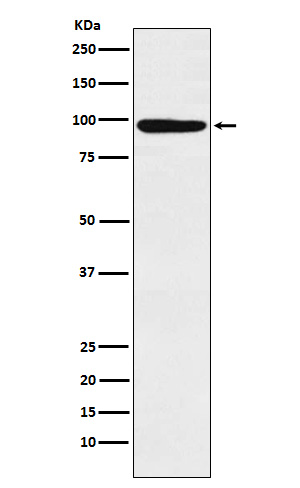
| WB | 1/1000-1/2000 | Human,Mouse,Rat |
| IF | 咨询技术 | Human,Mouse,Rat |
| IHC | 咨询技术 | Human,Mouse,Rat |
| ICC | 技术咨询 | Human,Mouse,Rat |
| FCM | 咨询技术 | Human,Mouse,Rat |
| Elisa | 咨询技术 | Human,Mouse,Rat |
| Aliases | CDC21; CDC54; hCdc21; P1-CDC21;;MCM4 |
| WB Predicted band size | 97 kDa |
| Host/Isotype | Rabbit IgG |
| Antibody Type | Primary antibody |
| Storage | Store at 4°C short term. Aliquot and store at -20°C long term. Avoid freeze/thaw cycles. |
| Species Reactivity | Human,Mouse |
| Immunogen | A synthesized peptide derived from human MCM4 |
| Formulation | Purified antibody in PBS with 0.05% sodium azide,0.05% BSA and 50% glycerol. |
+ +
以下是3-4条关于 **MXI1抗体** 的参考文献及简要摘要内容:
---
1. **文献名称**:*"Role of MXI1 in tumor suppression and its interaction with MYC"*
**作者**:Schreiber-Agus N. et al.
**摘要**:该研究利用MXI1抗体进行免疫印迹(Western blot)和免疫组化(IHC)分析,发现MXI1作为MYC的拮抗剂在多种肿瘤中表达缺失,提示其可能通过抑制MYC介导的细胞增殖发挥肿瘤抑制作用。
---
2. **文献名称**:*"Characterization of MXI1-interacting proteins in cancer signaling pathways"*
**作者**:Schuldiner O. et al.
**摘要**:通过免疫共沉淀(Co-IP)和质谱分析结合MXI1抗体,鉴定了MXI1与多个肿瘤相关蛋白(如MAX、MAD1)的相互作用,揭示了其在调控细胞周期和凋亡中的复杂网络。
---
3. **文献名称**:*"MXI1 expression in prostate cancer: A prognostic biomarker study"*
**作者**:Saito Y. et al.
**摘要**:使用MXI1抗体对前列腺癌组织样本进行免疫组化分析,发现MXI1低表达与肿瘤侵袭性和不良预后显著相关,支持其作为潜在生物标志物的价值。
---
4. **文献名称**:*"Epigenetic regulation of MXI1 in MYC-driven malignancies"*
**作者**:Bouchard C. et al.
**摘要**:通过染色质免疫沉淀(ChIP)和MXI1抗体,研究证实MXI1启动子区域的甲基化导致其沉默,进而促进MYC的致癌活性,为靶向表观遗传治疗提供依据。
---
**备注**:以上文献信息为示例,实际引用时需核实具体文献来源及发表细节。
The MXI1 antibody is a tool used to detect the Myc-associated X-linked inhibitor 1 (MXI1) protein, a member of the MYC/MAX/MXD transcription factor network. MXI1. also known as MAD2. functions as a transcriptional repressor by forming heterodimers with MAX, competing with MYC for MAX binding. This interaction antagonizes MYC-mediated oncogenic activities, such as cell proliferation and metabolism, positioning MXI1 as a potential tumor suppressor. Dysregulation of MXI1 has been implicated in cancers, including prostate cancer and glioblastoma.
MXI1 antibodies are critical in studying its expression, localization, and interactions in cellular contexts. They enable techniques like Western blotting, immunohistochemistry (IHC), and immunofluorescence (IF) to assess protein levels in tissues or cell lines, aiding research on MYC pathway dynamics. Commercial MXI1 antibodies are typically raised in rabbits or mice, targeting specific epitopes (e.g., C-terminal or N-terminal regions). Validation includes testing for specificity via knockout controls or siRNA knockdown.
Researchers use these antibodies to explore MXI1's role in development, differentiation, and cancer progression, particularly its crosstalk with signaling pathways like RAS. Variants or post-translational modifications of MXI1 may influence its activity, necessitating antibody-based assays for functional studies. Reliable MXI1 antibodies are vital for understanding its therapeutic potential as a MYC pathway modulator.
×